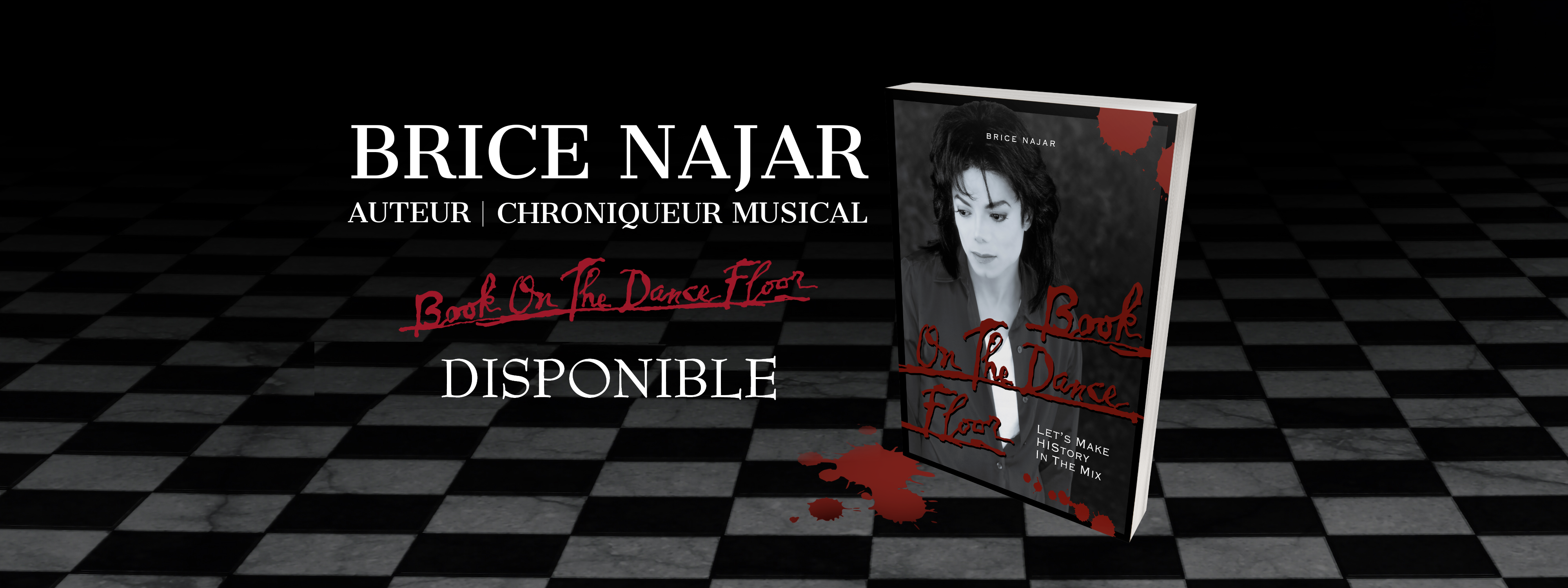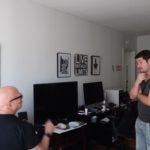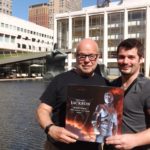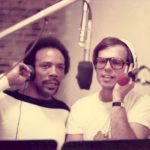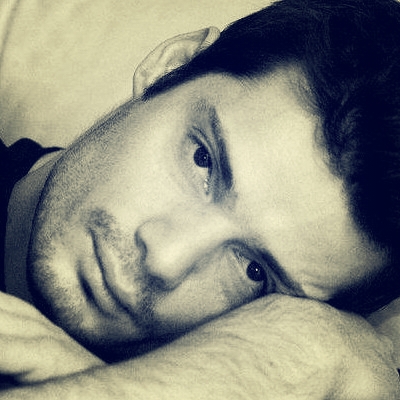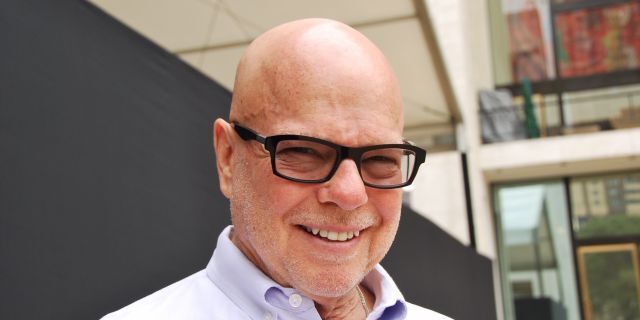
.
Thomas Bähler
The movie The Wiz shall remain one of the highest peaks of Michael Jackson’s cinema career. Still, it was musically speaking that this piece of art played a major part in Michael’s whole career.Indeed, he and Quincy Jones (who was co-producing the soundtrack) met during the shooting of the film and that changed the history of music for ever. Thomas Bähler, the co-producer of the track Ease On Down The Road, stands as the perfect witness to discuss their meeting. In 1973, he became Quincy’s friend and collaborator while getting hired as a vocal arranger at Motown where he met the Jackson 5’s lead singer. I managed to get an interview with him through the internet where it was then broadcasted on a web radio. Since then I have had the pleasure to talk again to the songwriter of She’s Out Of My Life and to meet him in New York where he signed my LP copy of The Wiz, an appropriate choice when one meets with such a great man.
First, can you tell us how you were contacted to co-produce the track Ease On Down The Road that would feature on The Wiz soundtrack?
Quincy Jones and I started working together in 1973. He heard some arrangements that I did for Sarah Vaughan and was pleased with them. He wanted me to work with him on his new album which was called Body Heat and which was his first gold album. So we had been working together since 1973 and that’s also the time that I started working with Michael and his brothers at Motown. I worked with them separately and if you fast forward to 1978 when Quincy was going to be the music director for The Wiz, then it was Sidney Lumet, the great director, who gave Quincy his first scoring opportunities since they were good friends. Quincy was working on the film and since a lot of my arranging had to do with voices, he asked me to join him on the film to deal with that. That’s how I became involved with The Wiz.
Is it correct to say that you played the part of an intermediary and allowed Quincy Jones and Michael Jackson’s meeting?
Oh, perhaps in a very small supportive way but you know, I had the pleasure of working with such wonderful people in my life that when two people I work with come together, I don’t really play a part in that necessarily. Quincy and I were very close and when he told me that Michael asked him to produce him, I said : « I think it’s a marriage made in heaven! » To me, Michael was alway our generation’s Fred Astaire but multiplied by several times because Michael was not only a great singer but he is an incredible dancer – he’s the most professional person I’ve ever met in my life! I also know Quincy very well and I know that he is made of the same stuff.
So I didn’t play a part in introducing them because they were working on the film together and they actually met on a very sweet sort of way. Michael in his character was pulling out of his costume all those little pieces of paper that had great wisdom on them because he was the Scarecrow with no brain. He pulled out a thing by Socrates and he mispronounced the name of the philosopher, and Quincy very quietly just said : « Actually the pronunciation is… » and he corrected him. Michael was like : « Oh, thank you! » That was a very sweet meeting like a mentor to a young person, and it remained so throughout their period together.
First of all, when you worked with Michael vocally, you never had to worry about what he did because he was the most professional and most prepared and most amazing person I’ve ever worked with. When I was working with the voices around him, whether it was his brothers or a choir or something of that sort, that was kind of my relationship with him. Then I wrote She’s Out Of My Life which was his signature ballad and of course, this brought us closer together too. It was actually during that period of The Wiz when Quincy played him the song, from the moment that he heard it, that he called it « the single »!
Still, as one of the first witnesses of their meeting, did you immediately realize how major it would be for the history of music?
You know, I don’t think at any time do we ever have that foresight. All I knew in my heart was that those were two men that I loved and believed in completely. When I heard that they were getting together I was thrilled! When we do albums and we cut records, we put out our hearts in what we’re doing and that’s all we can do. The rest of it is out of our control. So we do what we do best and give it everything that we have, and after that, I find I must release it. Picasso said that a painting is never finished : you just stop painting. But I had a special feeling, not in term of success or record sales, but about those two people that I felt so special about.
When Michael started The Wiz, he had to leave his family for a few months for the first time. How did he feel? Was he confident and relaxed or a bit anxious about that new situation?
The side I saw of Michael was always serenely confident even if I don’t know what he was feeling inside. I mean, reading his books and the books about him, I think he was very excited but he was a consummate professional and I had a professional relationship with him. Yes, we had a few personal conversations but they were very light-hearted. My brother and I were his principal vocal arrangers from the time he was 13 until he passed away, and he had more of a personal relationship with my brother in that he would call him from the road because Michael felt alone quite a bit. Yet, when he called they didn’t talk that much – it was just a contact that meant something to him. He called me a couple of time too but I don’t really know how Michael felt deep inside because he didn’t discuss those things with us.
On the professional side, there was nothing that you could ask him to do that he wasn’t already 10 steps ahead of you! He chose to do this, he auditioned for this role because basically Diana Ross was doing it and he was in love with Diana, I mean, in a very appropriate way but she was a very special person to him. Even though the Jackson 5 had left Motown, the wonderful thing about Berry Gordy is that there was never any animosity between them. They were thrilled to have Michael and he was an incredible Scarecrow. They gave him a chance to spread out into an area that he was already thinking about. He has never called his music videos « music videos » : they were short films. This man had one of the most incredible creative minds, maybe the most incredible creative mind that I’ve ever met, although Quincy Jones has always been my favorite in that category so… (laughs) But Michael was always forging ahead. He wasn’t unhappy with where he was but he was always looking for the next thing. So I found a very confident and supportive and happy Michael and if he was in any way not comfortable, I did not see that.
Could you share any particular memories you have of those studio sessions with Michael while working on The Wiz, please?
When we did The Wiz, Michael was not as successful as he became after Off The Wall and Thriller. Certainly he was well-known and again my relationship with him was professional and musical. When we were getting ready for the first single off of The Wiz album which was going to be Ease On Down The Road we first cut the track in New York at night. We had David Foster on piano, Steve Gadd on drums and Anthony Jackson on bass. Foster came up with a great leak that really changed that song and gave it more of a pop feel. Then I got on a plane with the tapes in my bags to fly out to Los Angeles to record Michael and Diana on it which was going to be the duet. I had worked with Michael for a long time, about 5 years at that point, but I had not ever worked or met with Diana although I had put together some voices and done things for Diana’s records. We recorded in Wally Heider studio on Cahuenga Boulevard and the time was set for 2 o’clock. Michael was right there as usual – I mean, he was ‘Mister On Time’. But Diana wasn’t there and we waited for quite a long time. When she got there, something was troubling her. It didn’t have anything to do with us but we all have our days, you know. The thing is when you’re a star, it’s pretty hard to have a bad day because all of a sudden people label you as being the way that you were on that bad day which is maybe one day in a hundred! So when she came in, she expected to see Quincy and she didn’t know me. She said : « Who are you? Where is Quincy? » I said : « I’m Tommy Bähler, and Quincy and I are co-producing this, so I’ll be doing your voices. Quincy is in New York taking care of the music for your film. » Michael was immediately feeling the tension and said to Diana whom he loved very much : « Oh, I’ve worked with Tommy for so many years and it’s gonna be fine. » It was very sweet how he sort of came to my defense.
I remember another time in the studio, after Thriller, when we happened to find ourselves in the booth, alone, and I said : « Hey, Michael, how are you doing, man? I mean, how’s life for you? » He looked at me with the sweetest look in his eyes and said : « I just wish I could go to the store… » This is what happens with people and I’ve seen it so many times because I’ve had the pleasure of working with Elvis Presley and The Carpenters (that my brother and I sort of discovered). I think that we, the public never see what a toll it takes on them. It killed Elvis, it killed Karen (Carpenter) and eventually, it killed Michael… There are very few people that I have seen and that have had this notoriety in their lives that could handle it. Frank Sinatra was one because he was the Michael Jackson of his time. It doesn’t matter who you are : you get to a point where people start buying you. I’m appreciative that I have always worked through what I call the birth canal because we’re there to work on the music, we’re not on the retail side. People don’t know who we are and I love the fact that they don’t know who we are. Yet, we’re very much a part of the music and we have these wonderful relationships with all these incredible artists. They’re comfortable with us. When my brother and I would go up to the ranch to do some arrangements for him (long after 2001 and his last record) and Michael would see us, he would run to us because we were family! There was a certainty and a safety and a true love there. It had nothing to do with who he was because I knew him since he was a kid. I loved Michael as a person and he was the most talented and disciplined person I’ve ever met. But this is what I’ve seen with so many people who become these superstars – it’s very difficult. Once I was at the ranch some time and they said : « Why don’t you take the cart and go pick him up : he’s finishing dance. » He danced 3 hours a day, you know, and I thought maybe he would say : « Ah, cool ! Let’s go and get a glass of water! » but when he came out, he said : « Oh, Tommy, let me show you what I just learnt! » It was always about creation and reaching further. It doesn’t mean he was not satisfied – he was satisfied with who he was but he was using that as a platform to reach further.
Regarding the song You Can’t Win and as Michael’s vocal coach on it, maybe you can answer that question about the ‘blues’ tone at the end of the track. Do you think it’s something Michael could have used more in his discography?
Only Michael could answer that! I don’t know anybody that ever told Michael how to sing because he came so complete. If there was something that didn’t feel right, I’m sure somebody would have mentioned it – me or Quincy or someone else. I love the fact that he was diving in into his deepest voice at that point and I think that it was part of his transformation of going in the film and also leaving his family. There was a lot going on at that same time – he was becoming Michael.
In France you may not know of this group but there’s an American group called The Lennon Sisters that my sister-in-law is a member of. In the very early days of television, they were America’s sweethearts. My sister-in-law worked from the time she was 9 years old. She and Michael were friends as well and she understood him and shares my opinion. She felt that her childhood was stolen from her, even though it was not stolen in a bad way. When you are before the public as a young child, you’re not a kid in the yard kicking a ball. When we were recording so much at Motown, after 4:30 in the afternoon, the limo would pick up the kids from school and bring them to the studio which was south of Santa Monica Boulevard and right across a park called Poinsettia Park. I remember seeing more than once Michael getting out of the limo and looking at the children who were his age playing in the park, kicking the ball, chasing each other, doing what kids do. And I saw him tear up… This is what happens with this kind of life. I’m not saying that’s bad because my sister-in-law is a wonderful woman but when she looks back at her life, she says : « I wish I could have been a kid… » Yet it was done in a very loving way but all of a sudden when you’re the bread winner like Michael was at 6 years old, it has an incredible effect on your life and what you do.
I say that because at the time of The Wiz when he was starting to take charge of his own decisions, he was such a visionary. He had the vision to buy ATV Music, for instance. He studied as well – there was no greater student of our industry than Michael Jackson. At the same time, there was a dichotomy of him coming out of his cocoon and blossoming into a young man and saying what he wanted. Regarding his singing, it was the same – nobody ever told Michael how to sing. It was already in him and it came up perfect! If he wanted him to sing low, he sang low, and I don’t think anybody would have coached him about that. He came so prepared and we were always astounded, I can tell you because I’ve been around him so much. On She’s Out Of My Life, he cried at the end of the song. He said : « I’m sorry, fellows, can we do that again? » So we did several takes on it and he cried on most of them. It was 1977 or 1978 and he was about 20, so I said : « Michael, is there something in your life that this is touching? » He said : « No, I just got into the lyric, man… » This is the kind of artist he was – he lost himself in the moment. This is why I think he is Michael Jackson. This is why I think Barbra Streisand is Barbra Streisand. Or Sinatra was Sinatra. Magic moments!…
